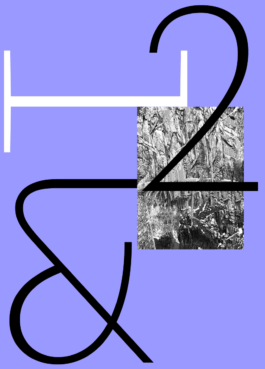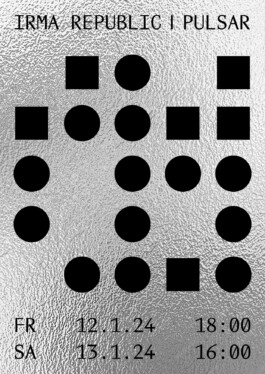#1 + #2
The Secret Life Of Us All: Poetiken eines Ineinandergehens. Part I & Part II.
Date
Part I: 30. March - 02. April 2023
Part II.
Artists and Researchers
Nino Baumgartner | Sarah Burger | Die Gärtner des sechsten Massenaussterbens | The Annotations of the IIRRM | Rudy Kanhye & Lauren La Rose | Zofia Kwasieborska & Georg Keller | Olga Kokcharova, laptopradiø | Lulu&Whiskey | la maison du jardinier | Pali Meursault | Ernestyna Orlowska | Camilla Paolino | Nathalie Rebholz | la soupe | Young Boy Dancing Group | Boisseau & Westermeyer
«When we try to pick out anything by itself, we find it hitched to everything else in the Universe»
(John Muir (1838 – 1914) in: ‹My first Summer in Sierra›, 1911)
Exhibition Text
Ecology means that we accept mutual connections and dependencies and investigate them. It is about the relationships we maintain with ourselves, others, and objects. And since these relationships are mutual, it stands to reason that these participants can also be described as ‹Non-Human People› (Vgl. Timothy Morton, “Humankind: Solidarity with Nonhuman People” (Verso, 2017) and have their autonomy attested.
Ecological thinking permeates everything, from technology to economy, it can be applied everywhere. It's about the space we're in, about the connections between all inhabitants in that space, how we behave in it, and which tools we use. How do we think in this situation, with these tools? How does their use affect the material world? How do we deal with this paradoxical situation that they are simultaneously ecological and pose an inherent danger for us and our world?
Technology, understood as our interface to the material world, ultimately binds us to it and our environment. It cannot be separated from ecology and even shares its typical characteristics: complexity, intertwined dependencies, distribution of control and influence.
In its curatorial starting point, the project starts from a few precise questions and hypotheses that open to broader and more extensive areas. This allows us to address global issues without getting caught up in forms of arbitrariness. Artists, theoreticians, specialists are invited, together with other speakers and participants to investigate the following sets of questions and formulate hypotheses.
Complex of Questions
In Exhibitions, Discussions, Lectures, and Workshops etc., the Following Questions Should be Pursued:
Everything but the World. The Role of Biodiversity and its Conditions
The Possibilities of Art. Critical Storytelling. If the existential crisis in the relationship between man and nature is so evident and discussed, with many available means of remedying it, why then is humanity going deeper and deeper into this self-destructive crisis? Why does humanity repress what they continuously keep shattering? The role of art, at this point, is to uncover exploitative and destructive actions in nature.
The Meaning of Symbiosis and the Role of the 'Person': Never Alone, We Were Never Individuals
The complex project focuses on forms of symbiosis, symbiogenesis and thus also the question about the concept of the person. ‘Nothing makes itself; nothing is really autopoietic or self-organizing.’ We are part of a larger whole. nature is not something out there, an object of our manipulation, but it is our very own background, we are connected to nature, embedded in it.
The Effects of AI on Our View of the World – Displaced Models and Interspecies Interactions
The findings of the now widely perceived AI/artificial intelligence have made it suddenly clear that intelligence cannot be defined as easily as previously thought. The possibility of constructing intelligent systems with technical means leaves us with the understanding that intelligence is not only a human exclusive entity. This has suddenly shifted the focus onto other intelligent systems around us. Plant communities demonstrate behaviour that we can call intelligent.
The Influence of Ecological Thoughts on the Psyche of a Society. The Injured Person.
One of the common defensive reactions to the climate crisis is repression or trivialization. We long for post-pandemic normality. But the current reality hurts. We drive cars, eat cheap food, fly around and constantly buy superfluous goods and along the way the forest dies, the globe heats up. The insects die and thousands of people flee floods or other environmental disasters. Getting back to normal is currently a hype that makes us disappear.
Planned Forms of Realization
«The Secret Life of Us All - Poetics of an Intermingling» should be implemented in parallel strands and in different forms. Communal and shared moments together should provide all participants opportunities to distribute knowledge and unlearn ingrained behaviours and assumed assumptions. Active participation should be made possible through a wide range of implementation forms: exhibitions, installations, performances, concerts, workshops, lectures, round tables, discussions, screenings, listening sessions, radio, publications (blogs, print).
© IRMA Republic 2022 • Impressum | ♥ Instagram | TikTok | Facebook | Mail

